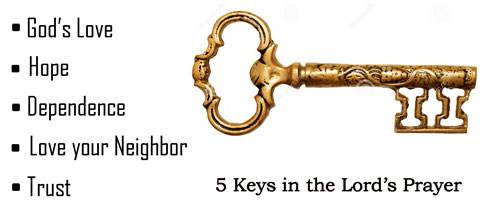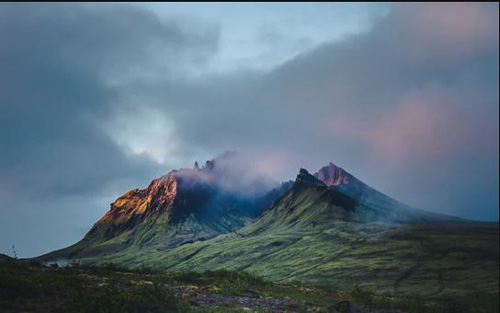Sermon, Proper 12, Year C, 2022
Luke 11:1-13

“Ask and it shall be given you; search and you will find; knock and the door will be opened for you. For everyone who asks receives, and everyone who searches finds and for everyone who knocks, the door will be opened.”
These two familiar sentences make up one of the great promises of Jesus to us, that when we ask we will receive, when we seek, we will find, and when we knock, the door will open.
But how many times in your life have you found that these promises don’t hold water, that what you asked for you didn’t receive, that what you sought you didn’t find, and that when you knocked, the door remained not only shut, but locked up tight?
That your prayers weren’t answered.
So did God let you down? Sometimes life feels that way—that God didn’t hear and didn’t answer and that our prayers are in vain.
But as Oswald Chambers says in his classic book of devotions, My Utmost for his Highest, “God answers prayer in the best way, not sometimes, but every time.”
And somewhere deep down inside we believe that God does answer even our seemingly unanswered prayers, because we are here today, and I bet that you, like me, keep praying even when prayer seems hopeless.
So let’s take a few minutes to knock on the door of today’s gospel and ask some questions of these words, and search for what God wants us to find today in these words of Jesus.
The disciples ask Jesus to teach them to pray and so Jesus gives them the words that we know as the Lord’s prayer.
This line, “Give us each day our daily bread,” is an obvious and sensible request. Every day, we ask God to give us what we need for the day, the necessities of life. In Biblical times, bread was essential to life. Even when there was nothing else, people had bread and eating only bread sustained them.
In the Old Testament, then the Israelites were wandering around in the wilderness and complained that they had nothing to eat, God provided bread for them in the form of manna that they found fresh on the ground each morning, and they gathered what they needed for the day.
And then there’s the story of the prophet Elijah, suffering like everyone else in a famine, and God sends Elijah to the brook called Cherith. Elijah goes there, and God sends the ravens to bring him crumbs of bread each day.
But I think that Jesus is telling us to pray for something more than bread when he asks us to pray for daily bread.
In John’s gospel, Jesus says that he is the bread of life, one of the great I AM sayings.
So we can think of this petition, “God, give us this day our daily bread” as asking for Jesus to be with us today, to be all that we need, to sustain us as bread sustains a hungry person.
When Jesus is with me, sustaining me, the other needs I have get put into the proper perspective. When I receive Jesus every day, I can see that my needs have already been met, often in unexpected and unusual ways, just as the raven fed Elijah.
Give us this day our daily bread. Give us Jesus, the bread of life. Asking for this daily bread, Jesus, every day, keeps Jesus with us each day.
I think the person who wrote the words of the old spiritual that Larry sang got the meaning of “Give us this day our daily bread.” Before asking for anything else, the writer asked for Jesus.
“In the morning when I rise, in the morning when I rise, in the morning when I rise, give me Jesus.”
After Jesus teaches the disciples the Lord’s prayer, he tells the them a story about someone going to a friend at midnight and asking for bread, and that due to the person’s persistence the person finally gets up and gives the person the bread he needs.
Sometimes, no matter how hard we pray, it’s hard to feel that Jesus is there with us, so Jesus reminds us to be persistent in praying for daily bread—to be persistent in praying to know the deeper presence of Jesus with us in our lives.
Prayer is not about magically making things happen if you pray hard enough, or pray the right way, but prayer is about helping us to learn ever more deeply what is already true, that is, as Oswald Chambers says, that we pray “to get perfect understanding of God.”
Prayer isn’t some mystical act to make Jesus appear, but we pray to realize ever more and more deeply what is already true, that Jesus is already with us, our daily bread.
Another way to think of this is to remember the teaching of Jesus in John’s gospel. “Abide in me, as I abide in you.” That abiding in Jesus grows our understanding of God over time. And when we abide in Jesus, we have all that we need—our daily bread.
The more we pray, the more we realize that God is with us, providing for us and sustaining us. So Jesus reminds us to be persistent in prayer.
Now we come to the “ask and it will be given you” part of the gospel.
When we talked about this passage in Bible study this past week, we wondered, what is “it?” “It” could be the specific thing I’m praying for—for instance, healing John Whitfield or Roger Key or any number of the people we pray for each day. But now, I’m thinking that “it” is something more.
What if “it” is Jesus himself?
“Ask, and Jesus will be given you.” We already know that having Jesus in our lives is the foundation for everything else we need in our lives.
Imagine what would happen if we ask for Jesus every time we pray, asking for Jesus first, before any of the other things that we need to ask God for—and those prayers are important as well. Asking for Jesus first, before the rest of what we need, is the idea.
Ask, and Jesus will come to you. And then everything else we think we need will work out because we have come to know that Jesus is with us.
Search, and you will find. What if we searched for Jesus before anything else? Jesus is the deepest and most wonderful mystery that we could ever search, and the more deeply we enter into the mystery of Jesus the more we will find the truth of our own lives, and the gracious presence of God with us.
Remember, the Bible is full of references for searching for God. Not too long ago we had this passage from Psalm 63, written by David, “O God, you are my God, earnestly I seek you.” I love that—David knows that God is with him, but he is still seeking out God. He says that his soul thirsts for God, and that his flesh faints for God. Would that we would all be so diligent in our searching and finding God with us in our lives.
And then “Knock, and the door will be opened to you.”
In John’s gospel, in another of Jesus’ I AM sayings, Jesus says that he himself is the door or the gate through which the sheep enter into his fold, where they will be safe.
In our lifetimes, we knock on so many doors. Some open and some don’t. But when we knock on his door, Jesus will always open and let us in, and then we become content with both the open and shut doors that we’ve knocked on, for the most important door, the door into the fold of God, has opened and we are abiding in Jesus.
At the end of today’s reading, Jesus says “How much more will the heavenly Father will give the Holy Spirit to those who ask him.”
That’s Jesus’ big, big hint for the disciples to understand the deeper meaning of what Jesus has been getting at in his teaching about prayer. Oswald Chambers says that “the Holy Spirit is the one who makes real in you all that Jesus did for you.” The Holy Spirit is the one who reminds us that we need to ask for Jesus as starving people would ask for bread.
So here’s what I’d like to remember from this sermon, and what I hope you’ll remember too, when we pray.
Give us this day our daily bread—give us Jesus.
When we ask for Jesus, we will receive Jesus.
When we search for Jesus, we will find Jesus.
And when we knock, we will see that Jesus is the open door through which Jesus invites us to enter, so that we can abide in him and he can abide in us.
And then, the first thing we pray for in the Lord’s prayer will be granted in our lives.
The Kingdom of God will become more and more a reality on this earth in our lives together as it is in heaven, for Jesus is with us, living in us, and all of the rest will be well.

